実施日 : 2007年12月04日(火) - 05日(水)
December 4 – 5, 2007: Abduction Issue Awareness Press Tour
投稿日 : 2013年08月23日
In the Run-up to North Korean Human Rights Violations Enlightenment Week
- Grasping the Realities -
The period December 10 - 16 is “Annual North Korean Human Rights Violations Enlightenment Week”. 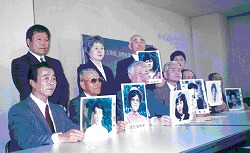
In this press tour, you will get a clear picture of the current situation of the abduction issue through briefings by experts on North Korea, a top official of the Ministry of Foreign Affairs of Japan who works for the six-party talks and Japan’s negotiations with North Korea, and Ms. Kyoko Nakayama, who is a special adviser to the Prime Minister and operates on the front lines of the abduction issue by linking the Japanese government with abductees’ families. You will also grasp the realities of abduction by reporting on North Korean spy ships and an abduction site. Moreover, you will report on the growing awareness in the international communitytowards the abduction issue, by hearing the direct opinions of the people who fight against abduction at the grass-roots level.
*******************************************************
“Annual North Korean Human Rights Violations Enlightenment Week” was designated in June 2006 with an aim to develop the public’s interest in and understanding of the human rights violation issues of the North Korean authorities including the abduction issue, while the whole international community tries to resolve them. In the run-up to the week, this press tour will cover the abduction issue, which is regarded as Japan’s most pressing problem, from various perspectives.
During the 1970s and 80s, many Japanese went missing in suspicious circumstances. Subsequent investigations by the Japanese authorities and testimonies from former North Korean agents gradually revealed that many of these cases were most likely to have been acts of abduction by North Korea. At the summit meeting in September 2002, North Korea admitted and apologized for its involvement in the abduction of Japanese nationals for the first time after its longtime denial.
In September 2006, the Headquarters for the Abduction Issue was established, headed by the Prime Minister. The Japanese government strongly demands that North Korea ensures the safety and prompt return of all abductees, under the policy that“Abduction is a critical issue which affects the national sovereignty of Japan, and the lives and safety of the Japanese people. Therefore there will be no diplomatic normalization between Japan and North Korea without resolving this issue”.
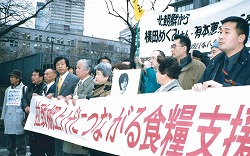 Currently, the Japanese government recognizes 17 Japanese abductees, and 5 of them successfully returned to Japan on October 24, 2002 after 24 years. However, the fate of the remaining abductees is still unclear, and North Korea continues to fail to provide a convincing account of their whereabouts. Moreover, it became clear that there were people who seem to have been abducted by North Korea from Thailand, Romania, Lebanon and other countries, besides South Korea. Today, the abduction issue is a human rights problem that concerns the entire international community.
Currently, the Japanese government recognizes 17 Japanese abductees, and 5 of them successfully returned to Japan on October 24, 2002 after 24 years. However, the fate of the remaining abductees is still unclear, and North Korea continues to fail to provide a convincing account of their whereabouts. Moreover, it became clear that there were people who seem to have been abducted by North Korea from Thailand, Romania, Lebanon and other countries, besides South Korea. Today, the abduction issue is a human rights problem that concerns the entire international community.
* Headquaters for the Abduction Issue, Government of Japan(the host) and The Foreign Press Center, Japan have co-organized this press tour.
Presentations:
1. Briefing by Ms. Kyoko Nakayama, Special Advisor to the Prime Minister (in charge of Abduction Issue)
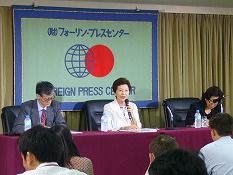 Since September 2006, Ms. Nakayama has been committed to resolve the abduction issue asSpecial Adviser to the Prime Minister. In July 2007, she ran for the Upper House election from the proportional representation block of the Liberal Democratic Party, and she was elected with the third highest number of votes within the party. She remained as Special Adviser to the Prime Minister (in charge of abduction issue) even in the reshuffled Abe Cabinet and the Fukuda Cabinet.
Since September 2006, Ms. Nakayama has been committed to resolve the abduction issue asSpecial Adviser to the Prime Minister. In July 2007, she ran for the Upper House election from the proportional representation block of the Liberal Democratic Party, and she was elected with the third highest number of votes within the party. She remained as Special Adviser to the Prime Minister (in charge of abduction issue) even in the reshuffled Abe Cabinet and the Fukuda Cabinet.
In autumn 2002, she went to Pyongyang to pick up 5 Japanese abductees as a member of the investigation team and as a councilor of cabinet secretary. Having the confidence of the abductees and their families, she has striven day and night as a liaison between the Japanese government, the abductees, and their families. With the desire of “wanting the international community to know more about the abduction issue”, she gave twobriefings to foreign correspondents at the Foreign Press Center, Japan: the first briefing was in March 2003, and the second at the end of September 2007 (photo).
This press tour will kick off with a briefing on the front lines of the abduction issue by Ms. Nakayama, who appeals to the public that“cooperation between the international community and international organizations is crucial for negotiations with North Korea, a nation with which Japan has no diplomatic relations”.
......................................................................................................................
2. Briefing by a Top Official of the Asian and Oceanian Affairs Bureau, Ministry of Foreign Affairs of Japan(MOFA)
At the Heiligendamm Summit in June 2007, the initiative taken by the Japanese government resulted in the adoption of the following forceful message in the chairperson's summary statement: "We also urge North Korea to respond to other security and humanitarian concerns of the international community, including the early resolution of the issue of abductions".
In addition, the Working Group on the Normalization of Japan-DPRK Relations met in March and September 2007 as a working group for the six-party talks. At the working group meeting in September, Japan and North Korea agreed to mutually make efforts, discuss specific actions, and implement those actions in order to resolve the various outstanding issues including the abduction issue and to achieve normalization between Japan and North Korea. However, they did not produce any specific results.
Also in the six-party talks held at the end of September, it was confirmed that the two countries would take specific actions through intensive consultations between them. However, considering the overall situation including the lack of any specific development in the abduction issue after the six-party talks, the Japanese government has decided to extend its own sanctions imposed upon North Korea.
A top official of the Asian and Oceanian Affairs Bureau of MOFA will give you a briefing on the concrete efforts they have made toward resolution of the abduction issue under the policy of “dialogue and pressure,” and how the negotiations between Japan and North Korea are expected to move in the future.
......................................................................................................................
3. Visit to the Spy Ships Exhibition Hall at Japan Coast Guard Museum Yokohama
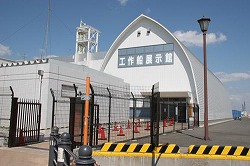 The Japan Coast Guard Museum Yokohama opened at the Yokohama Maritime Disaster Prevention Base on December 10, 2004, with the purpose of informing the nation about the current situation of the surrounding ocean areas of Japan and the importance of maritime security. The exhibits of the museum include spy ships and salvaged materials relating to the suspicious boat incident in the waters off the southwest coast of Kyushu which happened in December 22, 2001.
The Japan Coast Guard Museum Yokohama opened at the Yokohama Maritime Disaster Prevention Base on December 10, 2004, with the purpose of informing the nation about the current situation of the surrounding ocean areas of Japan and the importance of maritime security. The exhibits of the museum include spy ships and salvaged materials relating to the suspicious boat incident in the waters off the southwest coast of Kyushu which happened in December 22, 2001.
This is how the incident happened. The Japan Coast Guard tried to conduct an on-site inspection of an unidentified ship bearing the number “3705” (it was later found to be a spy ship of North Korea) on the high seas in the East China Sea, on suspicion of fishing illegally in Japan's exclusive economic zone.
However, since the ship declined this inspection, the Japan Coast Guard attempted a coercive investigation on a charge of breaking the fisheries law, resulting in a firefight with guns and rockets. The ship exploded in flames and sank at midnight on December 22.
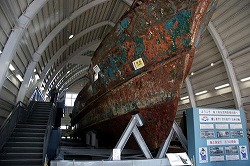
Later on, the ship(photo left) was raised and brought to Tokyo, and it was put on display at the Museum of Maritime Science until February 2004. The ship was moved and has been exhibited at the Japan Coast Guard Museum Yokohama from December 10, 2004 to today.
In this press tour, you will observe the special section on the abduction issue, which will be open from November 20 this year, and the ship’s hull pocked with bullet holes, many personal effects and weapons, and other exhibits in the museum.
......................................................................................................................
4. Discussion and Interview with experts on North Korea
A briefing on the current situation in North Korea, centered on the abduction issue, will be given by Professor Toshimitsu Shigemura of the School of International Liberal Studies at Waseda University. He actively participates in the mass media today as one of the handful of people who has a mastery of the North Korea field, including the publication of a book titled “Why does not North Korea collapse?” in July this year. He has supported the abductees’ families including Mr. and Mrs. Yokota over many years, expressing his view that “no diplomatic normalization between Japan and North Korea without resolving the abduction issue” was the correct approach.
Following this, a briefing on the most up-to-date analysis of the current situation in the Korean Peninsula, which fluctuates dramatically, will be given by Professor Masao Okonogio of the Faculty of Law at Keio University, in relation to Japan-North Korea relations, the nuclear missile’ issue, and security affairs. He is a leading expert and researcher on the research of the politics of the Korean Peninsula and has observed the abduction issue from a broad perspective.
......................................................................................................................
5. Visit the Abduction Site in Niigata, Briefing by Niigata Prefectural Government and Niigata Prefectural Police Headquarters
 Ms. Megumi Yokota (at the age of thirteen, photo) was abducted by North Korean agents in the late afternoon of November 15, 1977, somewhere near Yorii Town, Niigata City, on her way home from the junior high school after her club activities. It was just after she said good-bye to her friend, several hundred meters away from the sea shore. She is still missing today.
Ms. Megumi Yokota (at the age of thirteen, photo) was abducted by North Korean agents in the late afternoon of November 15, 1977, somewhere near Yorii Town, Niigata City, on her way home from the junior high school after her club activities. It was just after she said good-bye to her friend, several hundred meters away from the sea shore. She is still missing today.
You will visit the abduction site under the guidance of Niigata Prefectural Police, and will receive briefings from Niigata Prefecture Abduction Issue Office and Niigata Prefectural Police on the outline of other abduction cases that occurred in Niigata prefecture (2 cases occurred in 1978: of Mr. Kaoru Hasuike and Mrs. Yukiko Hasuike in Kashiwazaki City, and of Mrs. Miyoshi Soga and Ms. Hitomi Soga (mother and daughter) in Sado District).
......................................................................................................................
6. Interview with Mr. Shigeru Yokota, former representative of Kazokukai (National Association of Families of Japanese Abducted by North Korea), and Mrs. Sakie Yokota
 When Ms. Megumi Yokota went missing in 1977, an investigation by the Niigata Prefectural Police started, and Mr. Shigeru Yokota and Mrs. Sakie Yokota started looking for their daughter, Megumi, by all possible means. However, they could not find any clues.
When Ms. Megumi Yokota went missing in 1977, an investigation by the Niigata Prefectural Police started, and Mr. Shigeru Yokota and Mrs. Sakie Yokota started looking for their daughter, Megumi, by all possible means. However, they could not find any clues.
Then in 1997, 20 years after that incident, testimonies from the former North Korean agents who had escaped North Korea revealed the abduction of Megumi Yokota. Then Mr. and Mrs. Yokota decided to conduct their rescue operations by making their names known to the public, and the Kazokukai was established in March 1997. It was later integrated withNARKN (see below), which had been established as a support organization. Their self-sacrificing rescue operations have been conducted with the hope to “return the abductees to their families as early as possible”.
Mr. Shigeru Yokota, who is the father of Megumi and was a representative of the Kazokukai until recently, gave testimony and called for taking economic sanctions against North Korea at the Special Committee for Abduction of House of Councilors, the National Diet of Japan in June 10, 2005.
Megumi’s mother Mrs. Yokota also gave testimony and asked for support for the rescue operations for the abductees in the United States House of Representatives on April 27, 2006. The next day, she met with President Bush who promised her that “he would urge North Korea to return the abductees”. In December 2006, a photo exhibition using panels showing their rescue operations for abductees was held throughout Japan, taking the opportunity of Annual North Korean Human Rights Violations Enlightenment Week.
During the last 30 years since the abduction in 1977 to this day, Mr. and Mrs. Yokota have pleaded for the return of their daughter and have desperately worked for the resolution of the whole abduction issue. You will hear the course of their past activities and their message for the world media.
......................................................................................................................
7. Discussion and Interview with members of National Association for the Rescue of Japanese Kidnapped by North Korea (NARKN)
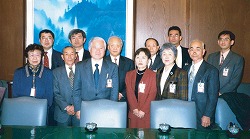 The National Association for the Rescue of Japanese Kidnapped by North Korea (NARKN or the ‘Japanese Rescue Movement’) is a coalition of non-profit organizations which shares the common goal of “rescuing” all the victims abducted by North Korea, beyond the boundaries of political parties and differences of view points.
The National Association for the Rescue of Japanese Kidnapped by North Korea (NARKN or the ‘Japanese Rescue Movement’) is a coalition of non-profit organizations which shares the common goal of “rescuing” all the victims abducted by North Korea, beyond the boundaries of political parties and differences of view points.
In April 1998, rescue organizations supporting the Kazokukai in various regions were integrated to become a nation-wide association. The NARKN currently consists of 40 NGOs including 39 NGOs in 38 prefectures and in 1 city, and 1 youth organization in Japan (as of November, 2007). Established as a sister organization of NARKN, the Investigation Commission on Missing Japanese Probably Related to North Korea (COMJAN) estimates that more than 100 Japanese have been abducted so far, and it has collected about 460 cases of suspected abductions and has made about 250 names known to the public. It continues its investigation today.
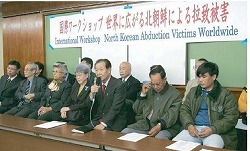 Moreover, it became clear that abductions by North Korea have happened all around the world, and the abductees are from South Korea, Thailand, Romania, Lebanon and other countries. NARKN is in close cooperation with an association for the families of South Korean victims and a rescue group in Thailand. In September 2007, representatives of NARKN participated in the Bangkok International Conference on the North Korean Human Rights Situation, titled “Abduction and Defection”, which was held for the first time in Thailand. As a closing session, you will interview representatives of NARKN.
Moreover, it became clear that abductions by North Korea have happened all around the world, and the abductees are from South Korea, Thailand, Romania, Lebanon and other countries. NARKN is in close cooperation with an association for the families of South Korean victims and a rescue group in Thailand. In September 2007, representatives of NARKN participated in the Bangkok International Conference on the North Korean Human Rights Situation, titled “Abduction and Defection”, which was held for the first time in Thailand. As a closing session, you will interview representatives of NARKN.
Tour Itinerary and Application Details:
1) Tour itinerary (tentative):
Day 1: Tuesday, December 4
09:40 Meet at Foreign Press Center, Japan (FPCJ)
09:45 Introduction by the tour organizers
10:00-11:00 Briefing by Ms. Kyoko Nakayama, Special Advisor to the Prime Minister (FPCJ’s Conference Room)
11:15 Leave FPCJ (Move by chartered bus)
12:00-12:50 Lunch
13:00-14:00 Visit the Spy Ships Exhibition Hall at Japan Coast Guard Museum Yokohama
(Leave the museum, return to FPCJ)
15:00-16:00 Briefing by a Top Official of the Asian and Oceanian Affairs Bureau, Ministry of Foreign Affairs(FPCJ’s Conference Room)
16:30-18:00 Discussion and Interview with experts on North Korea (same place as above)
(Leave FPCJ)
18:30 Arrive at JR Tokyo Station
18:52 Leave by Joetsu Shinkansen Max Toki 343
21:11 Arrive at Niigata Station (Move by taxi)
21:30 Check-in at Hotel Okura Niigata
Day 2: Wednesday, December 5
09:00 Leave hotel (Move by chartered bus)
09:30-10:30 Visit the Abduction Site in Niigata
11:00-12:00 Briefing by Niigata Prefectural Government and Niigata Prefectural Police
12:30 Arrive at Niigata Station
13:10 Leave by Joetsu Shinkansen Max Toki 326 (lunch on the train)
15:20 Arrive at JR Tokyo Station (Move by microbus)
16:00 Arrive at FPCJ
16:15-17:15 Interview with Mr. Shigeru Yokota, former representative of Kazokukai, and Mrs. Sakie Yokota
(FPCJ Conference Room)
17:25-18:25 Discussion and Interview with members of National Association for the Rescue of Japanese Kidnapped by North Korea (NARKN) (same place as above)
18:00 Disperse
2) Qualification: Bearer of Gaimusho Press Registration Card
3) Expenses: 12,000 yen per person including transportation, meals and accommodation
*FPCJ will inform the participants of payment methods, cancellation fee etc. later on.
4) Participants: Limited to the first 15 applicants on a first-come first-served basis.
(Only one reporter and one photographer from each company, but two participants from each TV team will be acceptable.) If the number of applicants exceeds 15, an upper limit may be set on the number of participants from each country.
5) FPCJ Contact: Mr. Koizumi, Ms. Yoshida and Ms. Koga (Tel: 03-3501-5070)
6) Remarks:
(1) There may be some restrictions on photographing and filming at the tour sites. Please follow the instructions of the officials on duty.
(2) Neither the Headquarters for the Abduction Issue, Government of Japan, nor the FPCJ will be liable for any inconvenience, trouble or accident that might occur in the course of the tour.


